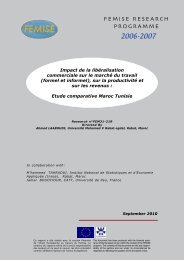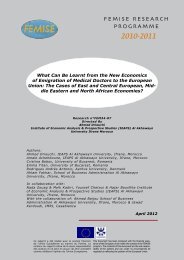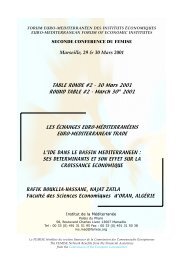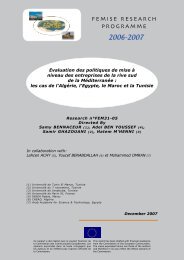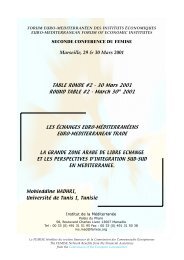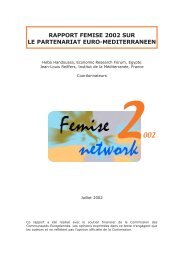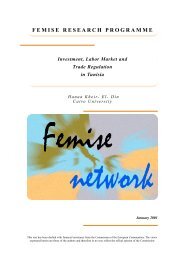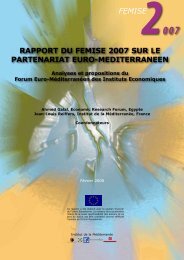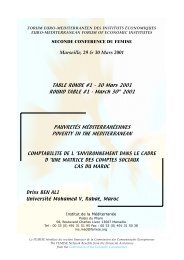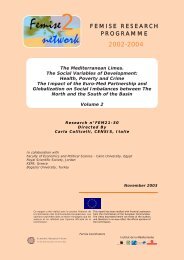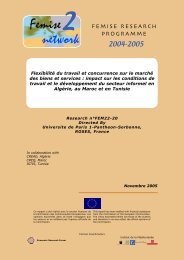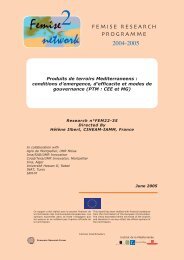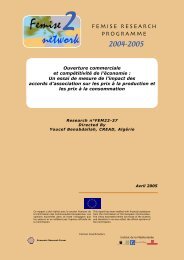PDF, GB, 56 p., 1,3 Mo - Femise
PDF, GB, 56 p., 1,3 Mo - Femise
PDF, GB, 56 p., 1,3 Mo - Femise
You also want an ePaper? Increase the reach of your titles
YUMPU automatically turns print PDFs into web optimized ePapers that Google loves.
• The higher the share of exports of the final good destined for free trade area.<br />
Where there is significant trade in the sector between partner countries than<br />
changes in rules of origin may be more significant. Clearly there could currently<br />
be high levels of trade between the partner countries in a given industry because<br />
the existing formulation of the rules of origin is not constraining. A further<br />
relaxation of those rules is then unlikely to have much impact. Conversely a<br />
tightening of those rules may well have a substantial impact. In the context then of<br />
the introduction of diagonal cumulation, we might not necessarily expect that a<br />
high share of exports to production would have much of an impact. Alternatively,<br />
to the extent that rules of origin are influence by protectionist political economy<br />
considerations, than the reverse might be the case. Industries which have a high<br />
share of exports to production are likely to be those where the partner countries<br />
have a comparative advantage, and thus may be sectors where there is greater<br />
pressure in the importing country for protection. In this circumstance, the rules of<br />
origin are more likely to be formulated in a constraining fashion.<br />
Country level characteristics<br />
• The smaller the country. As rules of origin act upon firms choices of supply for<br />
intermediates, in small countries it may be more difficult to competitively source<br />
intermediates domestically, and thus they are more dependent on imported<br />
intermediates.<br />
• Closely related to this, are the possibilities for sourcing intermediates from within<br />
the free trade area or from other cumulating countries. Hence the larger the free<br />
trade area, or the larger the area which allows for diagonal cumulation the less<br />
likely it is that the underlying rules of origin are restricting firms choices and thus<br />
impacting on patterns of trade and production.<br />
4.2 Estimating the importance of the key characteristics<br />
From a policy perspective it is important to obtain a clearer picture as to which of the<br />
preceding are particularly important in determining the potential constraining nature<br />
of rules of origin. The strategy we employ here is to combine the information we have<br />
at the sectoral level from the preceding set of regressions on the impact of diagonal<br />
cumulation with, relevant information on the sectoral characteristics identified above.<br />
Consider for example, the importance of partner country MFN tariffs, where as<br />
discussed earlier the higher the higher are these tariffs, the greater is the penalty for<br />
not meeting the rule of origin. The correlation coefficient between the height of the<br />
EU’s MFN tariff, and the estimated impact of diagonal cumulation, for Experiments 1<br />
and 2 respectively are 0.38 and 0.45 respectively. This indicates that there is a<br />
strongly positive correlation and that the height of the tariff materially impacts on the<br />
underlying degree of restrictiveness of the rule of origin.<br />
In order to explore this more fully we econometrically estimate the relative<br />
importance of some of the key characteristics identified above. The variable we wish<br />
to explain is the underlying restrictiveness of the rule of origin. We do not have a<br />
direct estimate of this. Instead we have estimates of the impact of the PECS system of<br />
diagonal cumulation on trade between cumulating countries derived from the<br />
preceding regressions. As cumulation is only likely to have an impact in the face of



